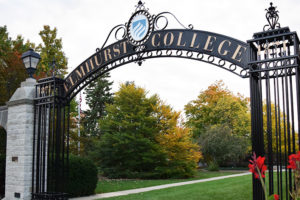
President Obama says everybody should go to college. Republican presidential candidate Rick Santorum retorts: “What a snob.”
During a March 15 lecture in the Frick Center, author and public intellectual Louis Menand explored some of the fundamental, yet timely, questions those statements raise: What is college as we know it today? Who should go, and what is its purpose and value?
Some 20 million students, and hundreds of billions of dollars, are invested in the U.S. higher education system, yet it is an enterprise whose structure hasn’t adapted to our society’s evolving needs, argues Menand, an English professor at Harvard University who is more widely known as a writer of trenchant commentary for The New Yorker, and the author of the 2002 Pulitzer Prize-winner, The Metaphysical Club: A Story of Ideas in America.
In his 2010 book, The Marketplace of Ideas: Reform and Resistance in the American University, Menand examined the “recalcitrant institutional cultures” that give so much of higher education “a dinosaur quality” when it comes to the pace at which change can occur.
In his talk, which shared the title of his book, he cited reforms that took place in the 1880s and ’90s regarding how one prepared to enter various professions. In the 19th century, a college degree wasn’t necessary to go to professional school, he said. One of the major reforms of American higher education was to require a bachelor’s degree before you went to medical school, law school or divinity school. These changes “professionalized the professions,” he said, elevating their status and their practitioners’ skill level.
But since those reforms, the framework of higher education hasn’t changed much, Menand said, despite enormous expansion and the opening of educational opportunity to previously excluded groups.
“The system can become sticky,” he said. “Today, there are a variety of notions of what the mission of higher education should be. “Maybe the system has become too big and too heterogeneous to work.”
Menand, whose talk was part of the College’s yearlong Democracy Forum lecture series, also discussed the value of an undergraduate liberal arts education as preparation for careers in the professions, and as a formative experience in creating principled, thoughtful, tolerant citizens.
He identified two theories about what purpose college serves. The first is that college is foremost a meritocratic selection process, designed to identify the highest-performing cohort for advancement into demanding professional schools. The second embraces a more inclusionary, democratizing goal: to train young people in “mainstream norms of taste and judgment, to make your citizenry more informed and responsive.”
If you’re a Theory 1 person, “you worry that the bachelor’s degree is losing its meaning” as it gets dumbed down for the masses, Menand said.
If you’re a Theory 2 person, you think the country is going through “a kind of academic tulip mania” in which students and their parents are mortgaging their futures to pay $50,000 to attend an elite institution such as Princeton or Stanford. “You think it’s about personal intellectual growth, not about a race to the top.”
When President Obama and Education Secretary Arne Duncan say everybody should go to college, they mean all young people should get some technical training, Menand said. “Industry demands more technical know-how than it once did.” Correspondingly, more Americans need some form of higher education to acquire that technical knowledge. One of the distinguishing features of the American approach is to incorporate liberal arts requirements into technical or vocational programs such as business, accounting, or hospitality management.
“I’m a Theory 2 person,” Menand said. “I think everybody should go, and it should strengthen our democracy.”